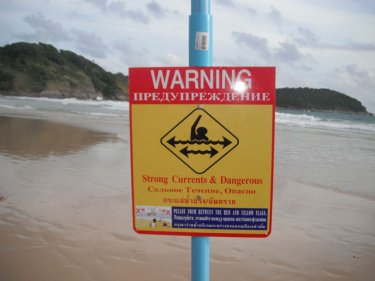Their plea comes in the aftermath of the death of Russian tourist Irina Tsyz, 24, whose life ended in the intensive care unit of a Phuket City hospital after she was carried alive from surf at Naithon beach on Wednesday.
A lifesaver who helped her to the beach was also hospitalised briefly for observation.
Warning signs in the Russian language were being placed at Phuket beaches this week, including outside the Naithon resort where the Russian newlyweds had been enjoying their holiday since June 8.
A spokesperson at the resort, questioned today about whether the resort gives direct and appropriate warnings to guests on arrival, put the telephone down on a Phuketwan reporter, saying: ''We have 300 Russian guests arriving.''
Nathon, Karon and Kata are the beaches where non-English speaking visitors to Phuket have drowned in recent monsoon seasons between April and November, when conditions are most dangerous.
Phuket Lifeguard Club leader, Prathayut ''Nat'' Cheryon, said today: ''Tour operators, resorts and lifeguards all need to work together to save lives.
''If the tour operators warn them, and the resorts warn them, then we stand a better chance.''
One tour operator who specialises in Russian guests told Phuketwan today that his customers were always given a thorough briefing about Phuket beach dangers during the monsoon season.
''The problem is that people who have just arrived on holiday are often not good listeners,'' said the tour operator, who prefers to stay anonymous.
Patong and Karon resort manager Javed Shaikh, who is on the executive committee of the Phuket Tourist Association, says all guests at his Horizon resort in Karon are warned on arrival about monsoon season dangers at the beach.
''The choice is ultimately up to the guests but at least if we have told them that the beach can be dangerous, we have fulfilled our responsibility, '' he said.
Latest available statistics show there were four drownings on and around Phuket in April, bringing the tally for the first four months of the year to 14 compared to 12 at the same stage in 2010.
An increase in the number of lifeguards and training and equipment at 13 popular west coast beaches provide a better chance of rescue now on Phuket.
But preventative warnings still do not deter all swimmers from taking to the surf when the lifeguards fly red do-not-swim flags.







Sometimes, the resorts here are amazingly passive.
I recently went to a four-star resort in Rayong. At the beach, they had raised the red flag. So, I asked the lifeguard if that indeed meant it was not safe to go into the water.
He replied that is was perfectly safe, but they had just forgotten to lower the flag. Did they lower the flag after that message? No...
Posted by Michael on June 17, 2011 15:03